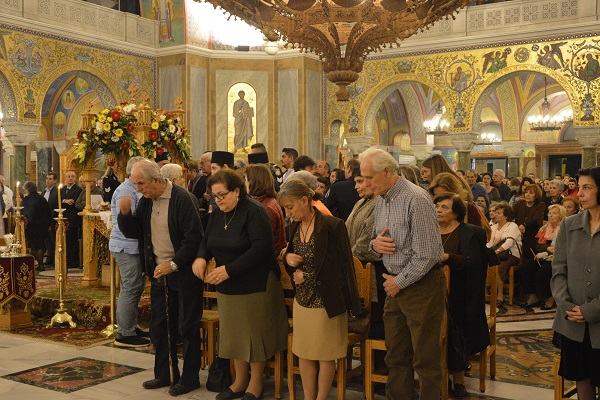“For this holy house…”
17 February 2022The Deacon, continuing the “Litany of Peace” in the Divine Liturgy, exclaims: “For this holy house and for those who enter it with faith, reverence, and the fear of God, let us pray to the Lord”. We learn from the Bible that the Holy Spirit not only dwells in the physical body of every baptized Christian (which is called “the temple of God” and the “house of the Lord”—see 1 Corinthians 3:16 and 6:19), but also the particular house or building that is dedicated to the worship of the Lord. It is the place where believers gather to pray and be sanctified by the Holy Mysteries, worshipping the Most High “in Spirit and in truth” (John 4:24). The Church is also called “the house of prayer” and the “temple of God” (1 Corinthians 11:22).

A new church is declared holy from the day it is established, as it is set aside only for the worship of God, and no other purpose. The Holy Altar is also there, on which the Divine Eucharist is offered. From the Liturgy of Holy Thursday the Sacred Bread, which is the Body and Blood of the Lord, is kept in the Tabernacle on the Holy Table. This is so Christians can have access to the Divine Eucharist in exceptional circumstances. In this way, the presence of God in every Orthodox church is continuous, and this holy House is the center of our sanctification, through which we also become holy. With the prayer of the Deacon, “For this holy house…”, we ask the Lord to safeguard our holy church always, and to fulfill the righteous requests of the faithful, who enter with faith and deep reverence for God. But why is a distinction made in this prayerful request? Why is the Lord not asked to accept the requests and prayers of all who come to the temple, but only from those who enter with faith and reverence?
The Church prayerfully guides its children. It is the Fountain of Divine Grace, and not some kind of magic that people can draw from whenever it suits them. There are some who think that they can just stop into the Church on Sunday morning, light a few candles, venerate the sacred icons and leave. They think that by doing this, they have somehow fulfilled a “duty” before God! But, in that very moment, Jesus Christ Himself offers the mystery of the Eucharist, prepares a Mysterious Table for us and invites us to attend with His Disciples: “Take, eat”, ”drink of this, all of you…” He is saying this, and yet some turn their backs and leave. Do they even think about how they approach God? If you believed that Christ Himself was presiding in front of you, would you leave?
Let us all enter the holy House of God not only with reverence but also with faith. To understand, without hesitation, that what is most important is not the act of lighting of candles or the veneration of the sacred images, but rather keeping our focus on why we do those things in the first place. For example, remembering that in venerating the image of the Lord, our worship goes to the Lord Himself.
Christians who enter the church must believe in two things: First, that whatever they pray for in faith (if it is for their spiritual benefit), they will receive it (see Mark 11:24). And second, that the church in which they pray is the holy House of God. The latter belief must also regulate all of our behaviors within the church. I confess that with a lot of grief our priests are forced – especially during the summer months – to remind churchgoers to enter the temple in modest clothing. Men or women, dressed for swimming in the sea, can not enter the church like that. Let them pack a simple dress or whatever else and get dressed before coming to the entrance of the church. It has been observed that some churchgoers follow the tradition of wearing a headscarf, ignoring the fact that the other parts of their body are left uncovered. This, if it is not done due to ignorance, reveals hypocrisy. The spirit of the Apostle Paul, which recommends women, while praying, to wear a veil on her head (1 Corinthians 11: 6), is related to the social conventions of his time, which he invests with theological meaning. Those who think that merely covering their heads is enough, while leaving the rest of their body exposed will not find support for this in the Apostle Paul. It would be beneficial for them to read his admonition concerning worship: “That the women adorn themselves in modest apparel, with propriety and moderation, not with braided hair or gold or pearls or costly clothing” (1 Timothy 2:9).
My dear brothers and sisters, the Orthodox churches around the world are often compared to peaceful harbors where the seafarers of this life often take refuge from hurricanes and storms. These safe havens soothe the soul from injustices, heal various wounds, and provide spiritual nourishment by the power of the Sacred Mysteries. This is in order to successfully continue the voyage to the port of Heaven, which is our final destination. Let us therefore ask, with all our hearts, the Lord to listen and fulfill the just requests of “those who believe, worship and fear God” entering our holy temples around the world. It is a debt of love. Amen.






